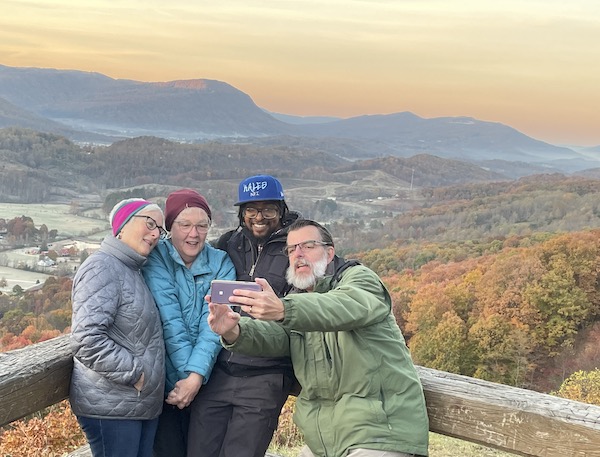The members of SAMS we met were welcoming and dynamic — and also very patient in disabusing us of some ideas we may have had about the challenges of living and working in coal country.

Our merry band of explorers arrived in Big Stone Gap, Virginia on October 20, 2022. Some of us had been to this far southwestern region of Virginia before and had looked forward to meeting friends from prior visits. This became obvious to me when we entered a restaurant on the first evening, and those in the restaurant and those in our group nearly jumped for joy at seeing one another. After an evening with everyone, we were certainly not two groups, but one.
Southwestern Virginia is a great distance, both physically and metaphorically, from the power centers of Richmond and Washington, DC. As a result, many decisions affecting the area are made without hearing local perspectives, and in many cases, to the benefit of those who don’t live in the area.
Southern Appalachian Mountain Stewards (SAMS) guided much of our weekend. The members of SAMS we met were welcoming and dynamic — and also very patient in disabusing us of some ideas we may have had about the challenges of living and working in coal country.
It was a whirlwind visit, with drives up steep mountain roads to look over the gorgeous landscape, the centerpiece of which was a truncated mountain or a distant maximum-security prison. We learned about mountaintop removal mining, an economic driver in the area, but the cause of tremendous ecological damage including degradation of the water supply and, along with clear-cutting lumber practices, a major contributor to catastrophic flooding.
In addition to the members and staff of SAMS, we heard from The Clinch Coalition about the benefits and negative effects of burgeoning tourism in the area. While it does bring some economic benefit, the use of mountain trails and streams for four-wheeler adventures can degrade the very landscape the adventurers are enjoying.
Our visit to the Appalachian African-American Cultural Center was a real eye-opener, along with the chance to talk with SAMS members and their families who recounted their own history. I learned about the struggles and successes of Black families in an area that I had wrongly believed to be a White community.
This is deep coal country. On my way to Big Stone Gap, I passed a huge coal-fired power plant. I learned that it has a big role in my ability to turn on the lights (or type this reflection) in Northern Virginia. The coal industry has a stronghold in the region. It contributes to the economy, but has devastating side effects, both in the immediate area and worldwide. Black lung is not a thing of the past. People in their 20’s have black lung. People of all ages suffer from it due to mining and even washing their husbands’ work clothes. The union is pretty much a thing of the past.
We were not there to learn only about the hard things, but also to learn about this exciting, resilient community. While this is a place of deep culture and diverse community, those far away from the local community tend to have images in mind that are stuck in the first half of the 20th century. One thread of the weekend was that many people who leave for jobs are called back to their mountain home. Young locals have formed a group called Stay Together Appalachian Youth (STAY.) LGBTQ youth are finding a place there, and there are educational opportunities with the University of Virginia’s College at Wise and Mountain Empire Community College (MECC). Towns are experiencing a resurgence in commerce, with more restaurants and community activities such as the lively block party in Big Stone Gap that drew many people to the music and food. We had the chance to enjoy the tastes and sounds of the biggest craft fair I have ever seen at MECC.
I have been a Virginian for more than 40 years, but though much of the music and culture of southwestern Virginia had intrigued me for years, I had never been there. I am grateful for the opportunity and for the new friends I have made, and I look forward to returning.
Christy Smith | November 2022